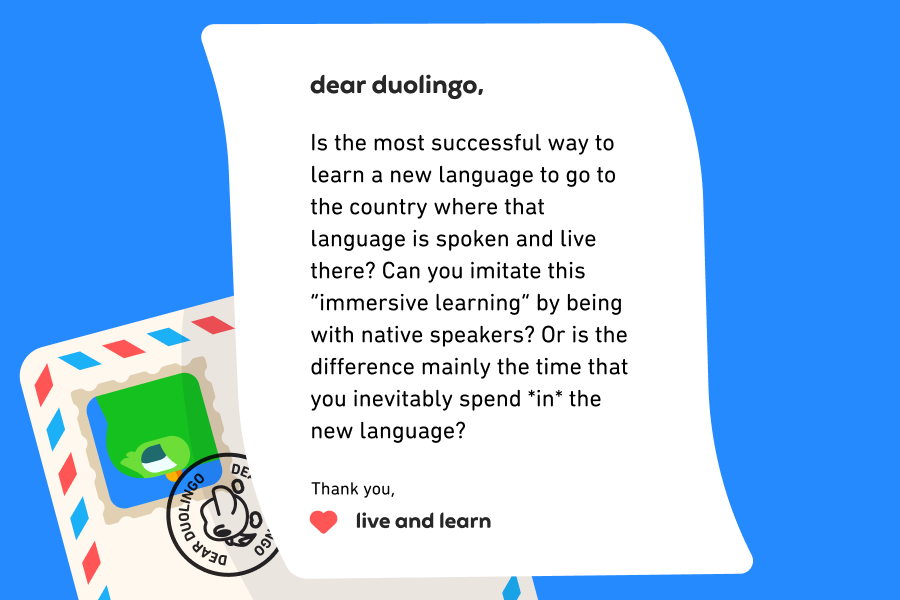Welcome to another week of Dear Duolingo, an advice column just for learners. Catch up on past installments here.
Hi, everyone! This week, I'm taking over Dear Duolingo since it's a question I've thought a lot about—in fact, I even did research on it for my dissertation. 🤓 I bet it's crossed your mind, too!
Our question this week:

This can be a complex question to answer because the reality is that it depends!
People sometimes have the impression that immersion is guaranteed to lead to progress, but learning from an immersion experience can be harder than you think. It's not for everyone!
There are certainly benefits to immersion—and I'll cover those below—but it can also be tricky for reasons that have less to do with language and more to do with how we behave as people.
For this post, I'm going to focus on the kind of immersion that happens when an adult learner goes to a new community to learn the language. (But there are other kinds of immersion, too—like Spanish immersion schools in the U.S., for people wanting their kids to learn Spanish.)
Here are all the factors to think about when it comes to immersion!
Basic requirements for learning: need and exposure
First, it's worth explaining what is required to successfully learn a language: exposure to the language and a need to communicate with it. If you are exposed to a language but never need to use it, you won't really learn it—and if you need the language but don't get enough exposure, you also won't have much success.
Compared to doing Duolingo every day or taking a language class, immersion magnifies learners' need and exposure, but by like a thousand. 😅 That level of intensity can be overwhelming, and it causes some people to subconsciously avoid situations where they need to use the language—which consequently reduces their exposure to it as well.
It could seem like immersing yourself in the community would be a quick fix: quit job, sell belongings, buy beret, head to airport, learn French in France. ✅
But in fact, research shows that planned, tailored language instruction is—hour for hour—more efficient for learning than immersion. Why is that?
Why immersion can be challenging
To start with, most of us can't quit our lives at home and have a long-term immersive experience, unfortunately. But there are other reasons, too.
Language challenges
One significant challenge of immersion—and the research-backed advantage of language instruction—is getting the right kind of exposure. For example, in Duolingo lessons, you are exposed to French that has been carefully scaffolded (it builds upon what you already know). Lessons are also deliberately designed to focus on specific vocabulary and grammar topics, dividing up language into manageable chunks, and then strategically repeating information to help you remember it.
In immersion settings like traveling, studying, or working abroad, you interact with locals at their level—and people won't always know how to tailor their language in the ways you as a learner need it! Most native speakers don't have a good sense of what learners study and when, what counts as advanced grammar versus what is taught early on. (And why should they? They didn't learn it in a classroom!) So you'll be hearing a lot of language meant for other speakers, to accomplish all sorts of communication purposes… but it won't be optimized for efficient learning!
Unexpected challenges
You might have thought about the language side of things before—but that's not even half of it! It's surprisingly easy to get through your day without saying much at all. If you and I go to a cafe in Paris, I might order a specific drink and a special local treat, all in French—and you could easily and reasonably just say pour moi aussi (for me, too) to place your order! It turns out you can take public transportation, buy food in the grocery store, and even order by pointing to a particular pastry at the bakery—all without uttering a word. That's not to say that you couldn't strike up a conversation with someone in those settings (you can!), but for many learners, it's really hard to take that kind of risk. Plus, talking to strangers can have different cultural rules in different places, making their reactions a bit unpredictable.
Day-to-day immersion can be often challenging and exhausting—even for the most motivated learner. Feeling like an outsider can be uncomfortable, which makes it tempting to avoid the very speaking opportunities that you were seeking when you decided to immerse yourself in the first place. When students study abroad, they tend to stick together, whether they are from the same university back home or part of a larger, international program. Often in groups of people with mixed language backgrounds and different proficiencies in the community language, English becomes the default lingua franca. It takes a lot of effort to rely on a new, weaker language if there's an alternative language that everyone in the group knows better.
Why immersion can be great
The challenges of immersion should be considered seriously, but of course it can be a valuable opportunity, too.
Being immersed in the language and culture gives you the opportunity for lots of exposure to speakers of the language, so you can hear the language they use and observe how they use it for different communication purposes. If you can get up your nerve to chat with locals, you will create the need and exposure that will, over time, rocket your language skills!
Pairing immersive settings with good, planned instruction (like what you get on Duolingo!) can give you the best of both worlds: immersive language exposure to the way the language is used by locals, plus carefully crafted lessons that help you organize and optimize your learning.
Many of the benefits of immersion actually surface after you get home—your brain needs time to sort out and categorize all the chaotic input it received through immersion!
You can learn from anywhere!
All this to say, immersion is not necessarily the “best” or “fastest” way to learn a language—so don’t worry if 6 months in France is just a pipe dream. Immersion is one of many ways to support your language learning!
For more answers to your language and learning questions, get in touch with us by emailing dearduolingo@duolingo.com.
